Pre-Purchase Inspection Checklist
April 10, 2024
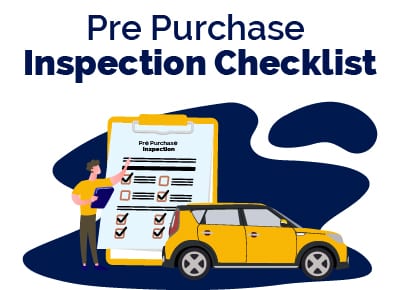

I am a serial entrepreneur and a consumer advocate. When I’m not helping car buyers, I love working on ventures that have a positive impact.
I run a cause marketing agency and serve on the board of Vayu Global Health where we are disrupting the medical industry and preventing the needless deaths of mothers and babies during childbirth.
It's easy to get caught up in a rush of excitement when you purchase a car.
We get it. We know how tempting it is to grab those keys and fire up the engine. But before the rubber hits the road, you owe it to yourself to make sure a thorough pre-purchase inspection takes place.
Otherwise, you may not get very far on that first joy ride!
Table of Contents
- What Is a Pre-Purchase Inspection?
- How Much Will a Pre Purchase Inspection Cost?
- How Long Does a Pre Purchase Inspection Take?
- Pre Purchase Inspection (PPI) Checklist
- PPI Checklist Item #1: Ask the Seller!
- PPI Checklist Item #2: Exterior Review
- PPI Checklist Item #3: Under Vehicle Review
- PPI Checklist Item #4: Tire Inspections
- PPI Checklist Item #5: Under the Hood Review
- PPI Checklist Item #6: Inspecting the Car’s Interior
- PPI Checklist Item #7: Crank the Engine and Take a Test Drive
- How to Get a Pre-Purchase Inspection
- Where to Get a Pre-Purchase Inspection
- Best Car Deals by Category
- Frequently Asked Questions
What Is a Pre-Purchase Inspection?
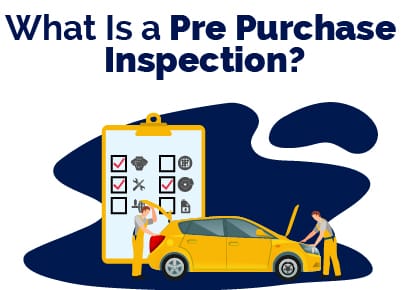 Pre-purchase inspections for cars are typically conducted by an automotive technician or (preferably) a certified mechanic. Ideally, the inspector has a good working knowledge of the car’s make and model. For example, someone who has spent their career working on Chevrolets is a good match to inspect the 2017 Tahoe.
Pre-purchase inspections for cars are typically conducted by an automotive technician or (preferably) a certified mechanic. Ideally, the inspector has a good working knowledge of the car’s make and model. For example, someone who has spent their career working on Chevrolets is a good match to inspect the 2017 Tahoe.
The technician or mechanic is responsible for inspecting the mechanical condition of the car as well as assessing its cosmetic condition and overall safety. The goal of the pre-purchase car inspection is to uncover any problems or issues with the car that could either present a safety hazard or a financial strain due to unexpected repairs.
Related: Consider an extended warranty to protect yourself from unexpected repairs.
How Much Will a Pre Purchase Inspection Cost?
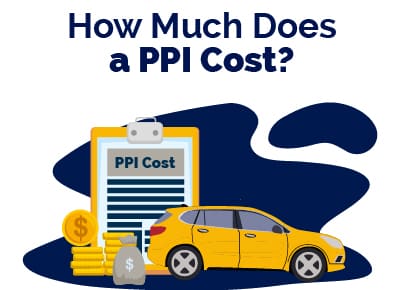 You can expect to pay between $100 and $200 for a pre-purchase car inspection by a qualified technician or mechanic. Bear in mind that a luxury car could mean a higher price if there are more “bells and whistles” to test and inspect.
You can expect to pay between $100 and $200 for a pre-purchase car inspection by a qualified technician or mechanic. Bear in mind that a luxury car could mean a higher price if there are more “bells and whistles” to test and inspect.
The purchase of your vehicle may hinge on the results of this test, so you should be sure that the terms are agreed upon in advance between you and the seller.
How Long Does a Pre Purchase Inspection Take?
In general, you should expect a pre-purchase inspection of an automobile to last at least an hour. More extensive inspections, like those needed for luxury cars with significant “extras,” could take several hours.
You might want to consider, especially in colder climates, leaving the car with the mechanic overnight so he can also assess the vehicle’s operation when it is cold.
Pre Purchase Inspection (PPI) Checklist
Many mechanics and technicians will have their own checklists and a preferred method for evaluating automobiles. If you have done your homework to find a qualified inspector with a good reputation, you should be able to trust that they have a thorough and reliable checklist.
However, because this is an important piece of the car-buying puzzle, any buyer should be familiar with the “must do” items on this checklist.
PPI Checklist Item #1: Ask the Seller!
There are various questions you should ask before purchasing a car and scheduling the pre-purchase inspection.
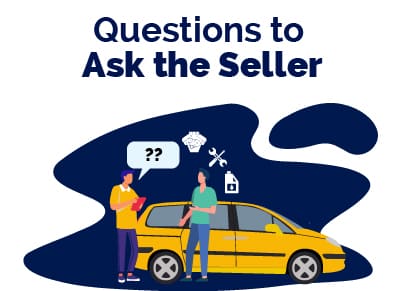 Here are the most common (and the most useful):
Here are the most common (and the most useful):
- Can you provide me with the maintenance and repair history for this car?
- Have you had regular oil changes, and what brand of oil did you use?
- Are there any known mechanical issues?
- Has the car’s timing belt been replaced?
- Since you have owned the car, has it been involved in an accident? (You should also check the CARFAX Report for accident history).
PPI Checklist Item #2: Exterior Review
This is where the qualified technician or mechanic takes over, starting with an exterior vehicle inspection.
It’s true you do not necessarily have to be a trained mechanic to spot dents and scratches, but an experienced and trained eye will also detect things like a paint mismatch that may reveal where previous bodywork was performed.
The exterior review should include not only checking for visible signs of damage (like dents or chipped paint) but also that the windshield, windows, and mirrors are free from cracks, that the exterior lights are functioning properly, and that the hood and trunk or rear gate operate as they should, opening and closing easily.
PPI Checklist Item #3: Under Vehicle Review
Much of what we rely on a technician or mechanic to inspect lies under the car, a place most of us never spend any time!
The mechanic’s PPI for under the hood will involve looking for any leaking fluids, ensuring the wheel lock is present, and nothing is hanging down or loose that should be secured.
PPI Checklist Item #4: Tire Inspections
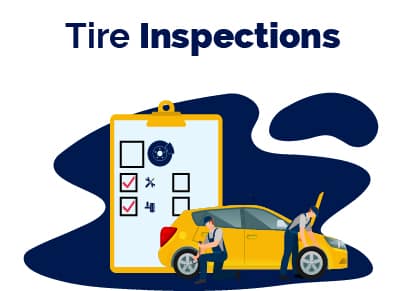 Whether or not your vehicle is road-ready often depends on the tires, and your PPI should include a thorough assessment of them.
Whether or not your vehicle is road-ready often depends on the tires, and your PPI should include a thorough assessment of them.
The technician or mechanic will want to be sure:
- All of the tires on the car are the same brand and size
- All of the tires have the same tread depth
- All of the tires are free of cracks or other damage
PPI Checklist Item #5: Under the Hood Review
This is where a qualified mechanic is incredibly important: you want a clear picture of what is happening under the hood before you purchase an automobile.
If there are significant problems with the car, they may be found under the hood. Your mechanic or technician will do a thorough inspection looking for the following:
- An oil dipstick that does not show signs of discoloration
- Batteries that are not corroded
- Fluid levels that are both clean and full
- Hoses for radiators and heaters that are still pliable and soft
The technician should also watch for any rust stains under the hood or visible signs of the automobile underheating.
PPI Checklist Item #6: Inspecting the Car’s Interior
Sometimes we think of the interior as having only “cosmetic” issues, but remember that interior features can be incredibly important when it comes to safety. For example, functioning seatbelts are a must!
The auto technician or mechanic will review the car’s interior to ensure:
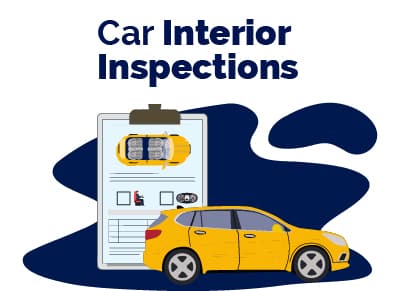 No check engine lights come on when the car is started
No check engine lights come on when the car is started- Power windows and locks all function correctly
- A sunroof (if present) opens and closes correctly
- The A/C and heat both work
- All turn signals function as they should
- Interior lighting works as well as any power or USB ports
- Seatbelts all fasten and unfasten as they should
- The horn and windshield wipers function correctly
PPI Checklist Item #7: Crank the Engine and Take a Test Drive
The final piece of the inspection puzzle involves driving the car to see how it performs. In addition to ensuring it performs without error lights flashing, the car should run smoothly while idling and not produce any strange noises or knocking sounds (in either an idling neutral position or while driving).
Signs that may indicate a problem with the vehicle include a jerking motion when the transmission shifts or while braking. Additionally, the mechanic should be sure to drive the car at several different speeds (between 30 and 65 miles per hour) to see that there are no problems as the vehicle accelerates.
How to Get a Pre-Purchase Inspection
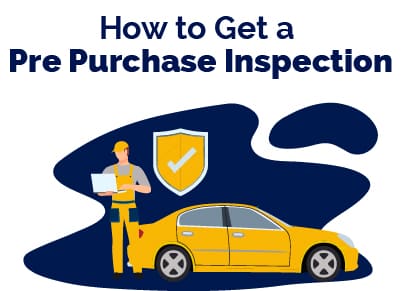 If you are purchasing a car locally, it is as simple as asking the seller. However, getting a pre-purchase inspection can be difficult if you are trying to purchase a car remotely.
If you are purchasing a car locally, it is as simple as asking the seller. However, getting a pre-purchase inspection can be difficult if you are trying to purchase a car remotely.
Let’s say you have found the vintage Corvette of your dreams in Houston, and you live in Boston. You can contact the seller and let them know you want a pre-purchase inspection, but be prepared to do the leg work to find the qualified mechanic in Houston AND coordinate either delivery of the car to his shop.
In some cases, you may luck out and find a cooperative seller who will participate in this process. If a seller is suspicious of an inspection, that is probably not a good sign!
Where to Get a Pre-Purchase Inspection
As we have continually emphasized, a certified mechanic is your best bet, but a trained automotive technician can also do a thorough inspection. It may come down to who is available for the job in the timeframe you need.
Plan ahead by contacting at least two or three mechanics in your area to find out their availability and pricing for pre-purchase inspections.
Best Car Deals by Category
Frequently Asked Questions
Where can I get a pre-purchase inspection for my car?
You can get a pre-purchase inspection from a certified mechanic, trained automotive technician, or through a shop that specializes in inspections.
Is a pre-purchase inspection worth it?
A pre-purchase inspection is worth it, especially if you're buying a pre-owned vehicle from a private seller. Also, if the car doesn't have an extended warranty, you should get it inspected, so there are no unexpected repairs down the road.
What does a pre-purchase inspection check?
An inspection will usually include an exterior review, under-the-vehicle review, tire inspections, under-the-hood review, interior check, and a test drive.
How much does a pre-purchase inspection cost?
You can expect to pay around $100 to $200 for a pre-purchase car inspection. Luxury cars, with more features to inspect, will cost a bit more.
Posted in Car Buying Tips |




